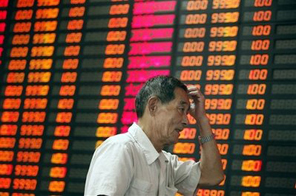Asian markets rebound with China
SHANGHAI: Most Asian markets rebounded on Tuesday; with China's key index edging up after tumbling the previous day, as investors weighed prospects for a global economic recovery. European markets opened lower.
The drop in Shanghai's volatile market Monday triggered a wave of selling in markets around the world, adding to concerns stocks have rocketed too high, too fast since March. But Tuesday the mood was steadier in Asia, helped by data showing that China's manufacturing growth accelerated in August to its fastest rate this year.
"Panic selling has stopped, at least for today," said Francis Lun, general manager of Fulbright Securities Ltd. in Hong Kong. "Investors are trying to regain direction after yesterday's sell-off."
The Shanghai Composite Index rose 15.98 points, or 0.6 percent, to close at 2,683.72, following a 6.7 percent plunge Monday that took it to its lowest level in three months.
Hong Kong's Hang Seng climbed 148.11 points, or 0.8 percent, to 19,872.30, while Tokyo's Nikkei 225 stock average rose 37.53 points, or 0.4 percent, to 10,530.06.
In early European trading, Britain's FTSE 100 index fell 47.58 points, or 1 percent, to 4,861.32, while Germany's DAX slid 64, or 1.2 percent, to 5,400.57. France's CAC-40 dropped 0.7 percent to 3,629.96.
Gains in Japanese shares were constrained by doubts over the ability of the newly elected Democrats to help revive the moribund economy. But news that car sales rose 2.3 percent in August from a year earlier, the first such gain in over a year, lifted shares like Honda Motor Co. and Nissan Motor Co.
Elsewhere in Asia, shares were higher in South Korea, Taiwan, Singapore and Australia, but fell in India, the Philippines and Malaysia.
Chinese investors remained jittery after seeing shares drop nearly 10 percent in the previous two sessions on heavy selling of big company shares due to fears the government might pull back on the lavish bank lending that has helped push prices sharply higher this year.
Added to that is the perennial worry that new shares might flood the markets as lockup periods expire and companies launch more initial public offerings. The combination would mean less money to chase more stocks.
"The market is too weak to attract fresh cash, while investors with shares in hand can't wait to sell out. This will last a while, not just a few days," said Qian Qimin, a strategist at Shenyin Wanguo Securities, in Shanghai.
Market heavyweight PetroChina added 0.5 percent as investors sought bargains among selected blue chips. Baoshan Iron & Steel climbed 3.1 percent and Industrial & Commercial Bank of China rose 2 percent.
The Shanghai benchmark is still about 50 percent higher so far this year, but it has fallen sharply after surging more than 80 percent by Aug. 4.
"Black August," some have dubbed the bleak weeks since then.
On Wall Street Monday, stocks fell in light trading. The Dow Jones industrial average slipped 47.92, or 0.5 percent, to 9,496.38. The S&P 500 index sank 8.31, or 0.8 percent, to 1,020.62, while the Nasdaq fell 19.71, or 1 percent, to 2,009.06.
U.S. stock index futures turned down after rising earlier. Dow futures were down 55 points, or 0.6 percent, to 9,431, whileS&P futures were down 0.6 percent to 1,014.10.
Oil prices rose. Benchmark oil for October delivery was up 44 cents to $70.39 a barrel in electronic trading on the New York Mercantile Exchange.
In currencies, the dollar rose to 93.06 yen from 92.94 yen late Monday in New York. The euro climbed to $1.4342, up from $1.4327. The Chinese Yuan strengthened to 6.8307 to the U.S. dollar, up from Monday's close of 6.8383.






